The Ministry of Transport of the Republic of Latvia, the Ministry of Climate of the Republic of Estonia and the Ministry of Transport and Communications of the Republic of Lithuania have started the implementation of the project in cooperation with the European Commission’s Directorate-General for Structural Reform Support (DG REFORM) and the support of the Technical Support Instrument (TSI) in order to create a unified approach to more effective Rail Baltica project implementation and railway infrastructure management, as well as for further provision of transportation services. The project will be implemented by a consulting company ERNST&YOUNG ADVISORY SAS (EY) selected as a result of the DG REFORM public procurement procedure.
On Friday, 25 October 2024, a project kick-off meeting was held at the Ministry of Transport of Latvia, where the parties involved discussed the goals of the global project, the achievable results and the applied methodology to find a unified approach in Rail Baltica railway infrastructure management and legal framework. The common goal is to reduce the obstacles related to the administrative differences of the countries, which can impede the effective cross-border operation of the Rail Baltica railway line.
The three priority directions of the project will be:
- Issues of unified cross-border public service obligations (PSO)[1];
- Development of effective legal framework and functional institutional framework for the Rail Baltica infrastructure management model;
- Development of a financing model for Rail Baltica infrastructure facilities, such as rolling stock depots, cargo terminals and passenger stations, the costs of which are not covered by the funding of the Connecting Europe Facility (CEF).
The project will conduct a case study so that according to Regulation (EC) No 1370/2007 of the European Parliament and of the Council of 23 October 2007 on public passenger transport services by rail and by road and the amendments adopted in 2016 one would develop guidelines for jointly ordered cross-border services. Until now, Latvia, Estonia and Lithuania have developed their PSO approaches to the railway industry for the territory of their countries. In its turn, in order to use rolling stock and infrastructure capacity effectively by ensuring cross-border connections, regional services along the Rail Baltica railway line will not be limited within national borders. It is necessary to conduct a market analysis and define the PSO model based on this, thereby making maximum use of the opportunities provided by the Rail Baltica infrastructure.
In addition, the project will elaborate recommendations for the improvement of the legal framework in order to ensure the management of Rail Baltica according to the principles of a single infrastructure, while safeguarding that all applicable European Union legislation is observed.
Although the owner of the Rail Baltica railway infrastructure in Estonia, Latvia and Lithuania will be the respective country where this infrastructure is located, the aim is to operate it according to common principles, terms and conditions. Thus, it is essential to synchronize the national and cross-border aspects of the use of Rail Baltica including safety management, traffic control, capacity distribution, fee determination principles and other related aspects in the operational model of infrastructure management.
Also, the project will analyze solutions for attracting additional funding at the European and national levels from public and private sources to cover the construction of Rail Baltica railway infrastructure facilities. CEF funding with a support intensity of up to 85% is allocated to directly eligible costs, mainly for railway superstructure and substructure works, as well as for the installation of railway systems. On the other hand, other infrastructure facilities related to the implementation of the Rail Baltica project are viewed as the project’s indirect eligible costs, for which funding is not allocated.
The parties agreed that regular meetings would be organised for effective project management. Also, the transport ministries of the Baltic States undertook to cooperate with the consultant EY and provide all necessary data and information for the implementation of the project.
Before the opening meeting, the project developers met with the representatives of the national implementer of the Rail Baltica project and the builder by getting acquainted with the progress of the implementation of the project in the centre of Riga, as well as the outlines of the railway station in person at the construction site.
Additional information
The EU’s Technical Assistance Instrument (TSI) is an EU program that provides tailored technical knowledge (expertise) to EU Member State institutions to enable them to design and implement structural reforms. At the EU level, TSI is coordinated by the European Commission’s Directorate-General for Structural Reform Support (DG REFORM), while each EU Member State has a national-level coordinating authority.
The implementation of TSI projects does not require co-financing by EU Member States. DG REFORM also ensures procurement procedures, contracting and payments to project implementers, thereby reducing the administrative burden on beneficiary institutions. In the implementation of TSI projects, the expertise of international financial institutions, international organizations, national experts of EU Member States or auditing companies is usually involved.
[1] Public service obligation (abbreviated in English – PSO) is a requirement defined or determined by a competent authority to provide general purpose public passenger transport services that a market participant, if it were to take into account its commercial interests, would not undertake or undertake to the same extent or under the same conditions without receiving additional compensation.


